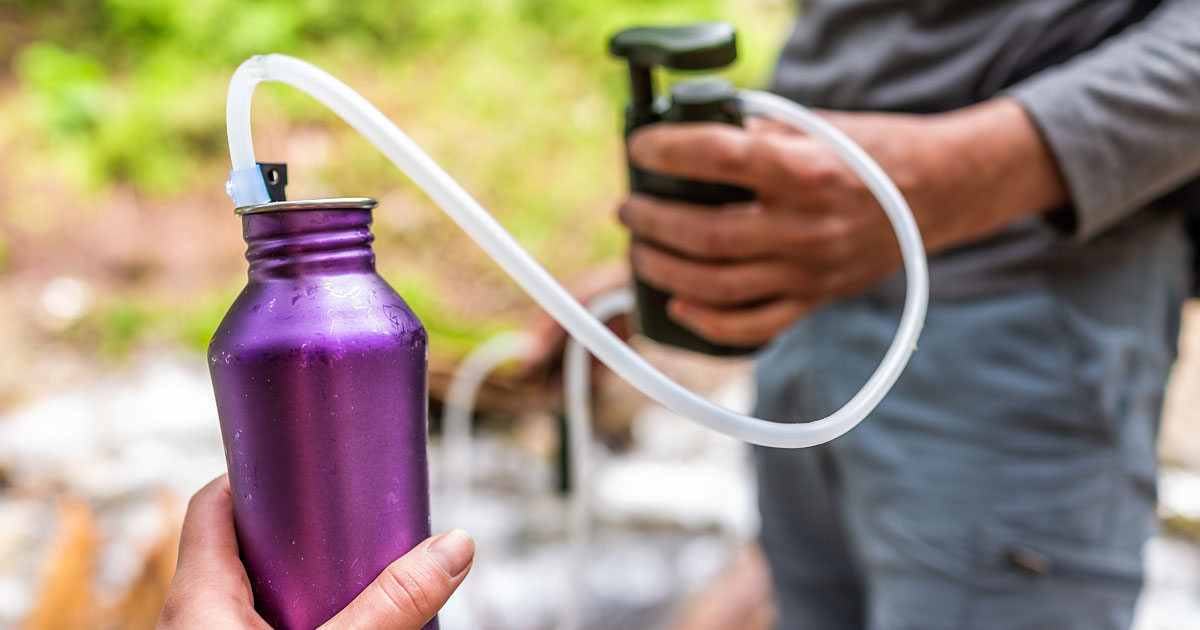1 Micron vs. 5 Micron Water Filter: What’s the Difference?
 Andrew
February 24, 2026
#1micron
#5micron
#flowrate
#micronrating
Andrew
February 24, 2026
#1micron
#5micron
#flowrate
#micronrating

- Help you understand micron ratings
- Explain what makes each filtration option beneficial
- Help you decide which filter is right for you
Understanding Micron Ratings
So, what exactly is a micron? Otherwise referred to as a micrometer, a micron is an extremely small unit of length. One micron is the same size as one millionth of a meter. Picture something small enough that you could line up 5,000 of them across a pencil eraser's width. We are talking microscopic.
In water filtration, a 1 micron filter captures particles so small you can't see them such as fine sediment and even some microorganisms. By contrast, a 5 micron filter handles the bigger stuff. Think sand, rust flakes, or chunks of debris. That's why many homes and businesses lean on 5 micron models for everyday use (though water source ultimately determines the proper micron rating).
Understanding micron ratings matters. It affects taste, clarity, and the performance of your appliances. When deciding between a 1 micron vs. 5 micron water filter, picking the wrong size can result in noticing off-colored or cloudy water, strange-tasting water, or the need to change water filters more frequently than expected.

Key Differences Between 1 Micron and 5 Micron Water Filters
Applications
When comparing 1 micron vs. 5 micron water filters, the right option depends on how and where you'll use it.
A 1 micron filter works well when ultra-fine filtration is a must, including for:
5 micron filters are better suited for larger particles, making them perfect for general sediment removal, role players in filtering well water, and as pre-filters for reverse osmosis setups.
Particle Removal
One of the differences between 1 micron and 5 micron water filters lies in what each filter removes. A 1 micron option captures very small particles. Rust flakes, fine sand, and even some microscopic organisms don't make it through. That level of filtration helps protect both taste and safety.
In a comparison of 1 micron vs. 5 micron water filters, a 5 micron filter is designed to deal with larger contaminants. If your household water shows visible sediment, this type of filter does an excellent job catching it before it reaches your sink or appliances. It blocks the big stuff. While it won't remove the finest particles, a 5 micron water filter still provides strong protection for your plumbing and equipment, all while delivering clear, reliable water for everyday drinking and cleaning.
Flow Rate
Think about the speed of delivery, too. Filters designed to block very tiny particles naturally slow the water down as it passes through. That's expected. A more open model, on the other hand, allows for faster flow, which is useful if your household goes through gallons of water in a short period of time. It's great for heavy water users.
A slower flow rate is a small tradeoff for cleaner water. However, this factor is something to consider if you frequently need to fill large pitchers, run multiple taps, or live with a large family. Given the differences between 1 micron and 5 micron water filters, a 5 micron water filter can be better suited for high-flow appliances. Customers with large sediment loads in their water should also evaluate adding a filter with a higher micron rating as an additional pre-filter to manage clogging and maintain flow rate through their system. Additionally, not all 1 micron filters are created equal. Larger filters with more surface area such as pleated filters or 20" x 4.5" "Big Blue" style cartridges can maintain flow rate that the smaller 10" x 2.5" filters can't sustain. Water quality and overall water pressure are also factors.
Filter Lifespan
The finer the screen, the less time it typically lasts. Ultra-tight filtration blocks even microscopic matter, but that also means it reaches capacity faster than a looser design. It's a trade-off. Imagine trying to sweep up flour instead of marbles. Flour clogs brooms faster.
A 5 micron filter generally lasts longer because it only captures larger debris. While this option means sacrificing extra-fine filtration, you gain convenience with fewer filter changes. When comparing 1 micron vs. 5 micron water filters, opt for the latter option for a lower-maintenance choice.
Always start with your Consumer Confidence Report or water test to make an informed decision.
Well water with high sediment load may require multiple stages or larger filters with dual-gradient depth filtration, yet still need to be changed frequently. Cleaner municipal water won't need that level of sediment filtration, but a 5 micron sediment filter is a common pre-filter to protect carbon cartridges and media downstream.
Costs
We can't ignore cost. Units made for fine filtration usually come with a higher price than those for coarse sediment. That's because the materials are top-notch and the construction is tighter. Simple as that. Living in an area with gritty or cloudy water? The pricier option could be the smarter choice long-term—and be aware that some water sources require multiple filters to treat.

Choosing the Right Option
Selecting between a 1 micron vs. a 5 micron water filter comes down to more than just numbers on a package. It requires thinking through how you and your household use water each day. Families who rely on well water or who live in areas with visibly cloudy water often benefit from a 5 micron filter.
Compatibility is a vital factor to consider when comparing the differences between 1 micron and 5 micron water filters. Not every system can handle a 1 micron filter. Also, forcing an overly tight water filter can create water pressure problems and place severe wear on your filtration system.
Inspecting your water, understanding your filtration goals, and considering the needs of your filtration system are crucial components when choosing a home water filter.
Which Water Filter Is Right for Your Needs?
Ultimately, deciding between a 1 micron vs. a 5 micron water filter isn't about one option being "better" than the other. Instead, it's about matching the right filter to your unique water quality and lifestyle.
All Filters makes choosing the right options simple. At All Filters, we make clean water easy. Our prices are affordable, and our selection is extensive. Need a filter for your home? Or maybe for your business? Our team is ready to help you find the perfect solution.






